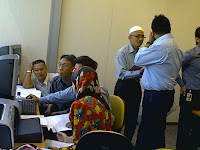 SAP has long been recognized as a leader in sustainability initiatives. The company considers sustainability a strategic priority, and takes meaningful steps to address sustainability in its own operations, as well as those of its customers. For example, SAP participates in the Software Working Group of Business for Social Responsibility (BSR), joining other software industry leaders who are committed to working together to understand and meet society's expectations for a responsible software sector and to develop products and services that enable sustainability.
SAP has long been recognized as a leader in sustainability initiatives. The company considers sustainability a strategic priority, and takes meaningful steps to address sustainability in its own operations, as well as those of its customers. For example, SAP participates in the Software Working Group of Business for Social Responsibility (BSR), joining other software industry leaders who are committed to working together to understand and meet society's expectations for a responsible software sector and to develop products and services that enable sustainability.In addition, the company has announced the appointment of its first-ever chief sustainability officer (CSO), Peter Graf, who will drive and monitor SAP's sustainability strategy.
As part of its ongoing commitment to sustainability – both in-house and in the global community – SAP has identified three key action areas:
Carbon-Reduction Targets
After analyzing its global environmental footprint, SAP has committed to a 51% reduction of its total greenhouse gas (GHG) emissions from its year-2007 levels of 513,000 tons CO2 by 2020. To date, as reported in its most recent sustainability report, SAP reduced its carbon emissions by 6.75% between January 1, 2008 and December 31, 2008.
SAP is continuing to build progress as it undergoes direct abatement efforts that include:
* Aggressive targets to reduce company car fuel consumption and office printing/paper usage, and significant investments in high-definition video conferencing in SAP offices worldwide to decrease the need for air travel
* The purchase of renewable energy
* Consolidation and virtualization in SAP's data centers (for example, arrangement of servers in designated "high-density areas" to reduce the need for air conditioning)
* Investments in and increased use of virtual event infrastructures for large internal and external events (for example, SAP recently ran three virtual events with a total of over 22,000 attendees, representing a significant decrease in air travel and its related impact)
* Targeted goal of achieving Silver Leadership in Energy and Environmental Design (LEED) certification as a minimum requirement for SAP buildings; new United States headquarters is targeting Platinum LEED certification
Focused Social Engagement
SAP is committed to helping ease the plight of some of the world's poorest citizens who reside at the lowest end of the economy, at the 'base of the pyramid.' SAP can play a unique role by collaborating to help some of our largest customers extend the reach of their value chains to include the poor. We can help our customers to bring very small farmers into their supply chain, or to empower rural women to become entrepreneurs as the micro-distributors of small consumer goods products. In cases like these, stakeholders will benefit from the support of SAP solutions and people.
Corporate Governance Initiatives
SAP recognizes that sound governance structures and responsible business practices form the very basis of all sustainable businesses. Among many examples of how we foster integrity, SAP does the following:
* Engages in proactive risk and compliance management programs
* Makes our SAP Code of Business Conduct public to all stakeholders
* Forbids all forms of bribery, including so-called "grease" or "facilitation" payments currently lawful in some jurisdictions
* Practices sustainable supply chain management
* Participates in the United Nations Global Compact both as one of the first signatories in 2000, and as a member of the 10th principle working group to support the global effort to control corruption and ease associated poverty and injustice
* Serves as a steering group member of the Transparency International Business Principles initiative
No comments:
Post a Comment